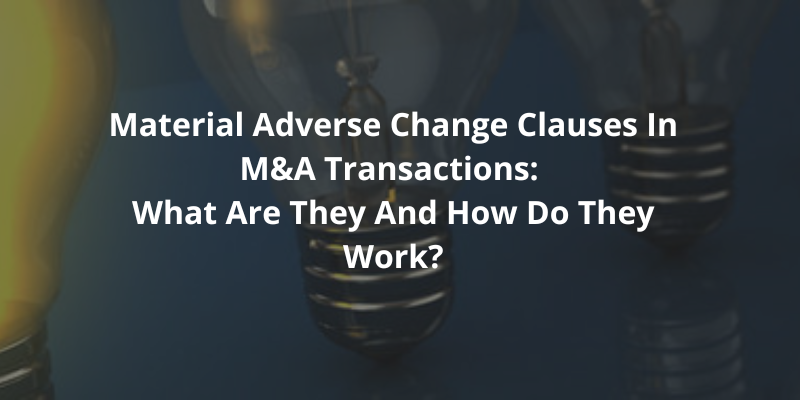Material Adverse Change Clauses In M&A Transactions: What Are They And How Do They Work?
11 Jan 2023
3 Oct 2022
min read

When buying or selling a business, there are several questions the parties must ask themselves before moving ahead with the deal.
One of the key things to ask is what legal protections are in place to help limit potential risks that may arise if something goes wrong with the transaction.
A common way that buyers and sellers can protect themselves in an M&A transaction is by including a material adverse change clause (also known as a “MAC” clause) in the sale documentation.
In this article, we will cover:
- what a material adverse change clause is;
- why they are used in M&A transactions;
- what happens when a material adverse change clause is triggered; and
- how material adverse change clauses protect both buyers and sellers in M&A transactions.
What Is A Material Adverse Change Clause?
In an M&A context, a material adverse change clause is a contractual provision that allows one party (usually the buyer) to back out of an agreement if there is a significant, adverse change in the other party's business or financial condition (also known as a material adverse event or “MAE”).
Material adverse change clauses are typically used in an M&A context and included in business sale agreements (e.g. asset purchase agreements or share purchase agreements), but they can also be found in other types of contracts.
For example, a lender who establishes a revolving line of credit facility might include a material adverse change clause in its loan agreement which allows it to withdraw further funding and/or demand early repayment if the borrower's business operations, assets or financial condition changes materially.

If the other party's business or financial condition does deteriorate, the lender can invoke the material adverse change clause to cancel the contract and avoid any further obligations.
While material adverse change clauses have had somewhat of a resurgence in recent times, they are still considered controversial in some arrangements and are often the subject of legal disputes.
There have been several legal proceedings initiated by aggrieved parties who have alleged the misuse of material adverse change clauses by the other party to back out of deals that they no longer want to complete, regardless of the other party's actual condition.
Because of this, material adverse change clauses must be drafted carefully to ensure that they achieve their intended purpose.
Why Are Material Adverse Change Clauses Used?
Ultimately, material adverse change clauses are used in an M&A context to reduce the risk for the buyer and seller between the agreement's signing date and the transaction's completion date.
If during this period, an MAE occurs that is of significant detriment to the target business, a material adverse change clause is used to give the buyer the right to terminate the agreement or possibly renegotiate the terms of the transaction.
Renegotiating the terms of the transaction may mean a reduction in the purchase price payable or some other change to reflect the deterioration in the value of the target business due to the MAE.
The term MAE can be drafted broadly and could include any type of event that has a detrimental impact on the target business. There are often carve-outs for extremely broad events (such as terrorism and even global pandemics) but an example of an MAE could include a significant downgrade in earnings due to the loss of a large customer of the target business.
There should also be a ‘materiality threshold’ that needs to be met before the material adverse change clause can be invoked. For example, an MAE may be defined as an event that causes a reduction in the value of the business of 10% or more.
From a seller’s perspective, the ‘materiality threshold’ of the material adverse change clause must not be set too low as even minor events could invoke the material adverse change clause, giving the buyer the ability to easily back out of the deal with limited grounds for doing so.

What Happens If A Material Adverse Change Clause Is Triggered?
What happens when a material adverse change clause is triggered or invoked, will depend on what the parties have agreed under the agreement.
In an M&A transaction, if a buyer becomes aware of an MAE occurring in relation to the target business, the buyer may attempt to invoke the material adverse change clause.
If for example, a condition precedent relating to the occurrence of an MAE has been included in the agreement, the buyer will usually have the right to terminate the agreement on the basis that the condition has not been fulfilled.
If there is any ambiguity in the drafting of the material adverse change clause and a dispute arises, there is a high risk that one or both parties will consider initiating legal proceedings to settle the matter.
Given the significant amount of time and costs associated with going to court as a result of poorly drafted contracts, it is crucial that you only use professionally drafted legal documentation for any transaction you are involved in.
How Do Material Adverse Change Clauses Protect Buyers And Sellers?
In any business deal, there's always a chance that something could go wrong.
Whether it's a natural disaster, a change in the political landscape, or even just a poor quarterly earnings report, material adverse change clauses can have a significant impact on a target company's bottom line.
As a result, material adverse change clauses have become an essential part of many business deals and provide certain protections to both buyers and sellers.
For buyers, material adverse change clauses provide some protection against buying a company that may be about to go through tough times. If the company experiences a material adverse change before the deal is completed, the buyer can back out of the deal (usually without penalty).
For sellers, material adverse change clauses provide some protection against buyers who try to renegotiate the terms of the deal after learning of an impending material adverse change. If the buyer tries to renegotiate, the seller may be able to walk away from the deal and keep the deposit.
In either case, material adverse change clauses help to protect both buyers and sellers from unforeseen circumstances.
Final Thoughts
Buying or selling a business can be a complex process and is not without risk. A material adverse change clause can provide you with the certainty you need if something goes wrong.
Protecting your interests by having the right legal documentation in place is crucial to completing a deal with as few issues as possible.
DocPro has various forms of agreements for M&A transactions between a Buyer and Seller. The benefit of sourcing your legal documents through DocPro is that we provide you with expertly drafted legal documents, that include key protections such as material adverse change clauses.
Get in touch with us today to learn more about how DocPro can help you with sourcing the right legal documents for your needs.
Please note that the information contained in this article does not constitute legal advice. As the laws of each jurisdiction may be different, you may want to speak to your lawyer.
Keywords:

